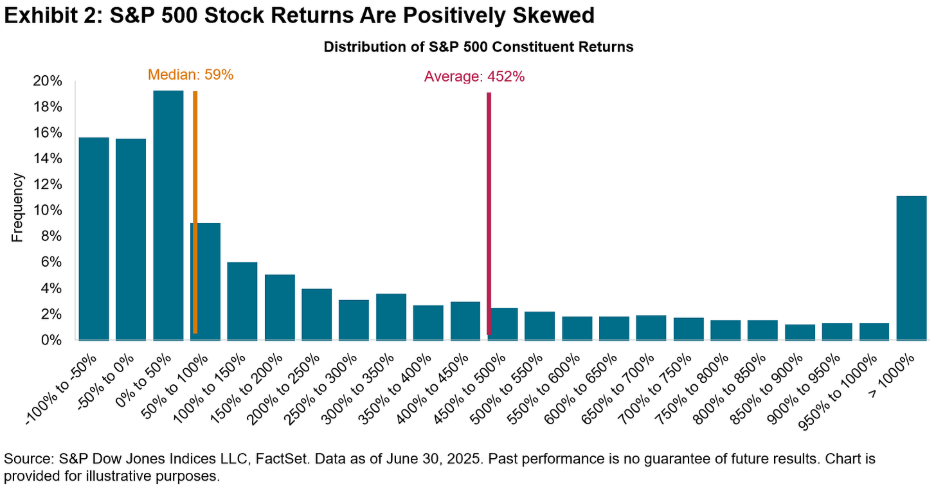My dad, despite many admirable qualities, struggled as an investor. It wasn’t for lack of effort, his analytical, engineering mindset just never seemed to translate to the world of investing.
I vividly remember him sharing his approach: he would only sell stocks that had gone up, proudly declaring, “You can’t lose money if all you sell are your winners.” At first, this strategy seemed to work, early gains gave him confidence. Yet, over time, he found himself holding a bag of underperforming stocks. Stepping back, the flaw was obvious: if you continually sell your winners, you’re left with only the losers. This approach practically guarantees a portfolio packed with declining investments.
Statistical evidence backs up why this is such a poor strategy. According to S&P Dow Jones Indices, from the beginning of 2001 through September 2025, only 19% of S&P 500 stocks outperformed the average stock’s return. In the first half of 2025 alone, just 44% of S&P 500 members beat the index; in 2024, that number dropped to 28%. In fact, most S&P stocks lagged the index in 13 of the past 24 years. If you’re lucky enough to pick a market-beating stock, your gains can be substantial,returns are positively skewed, with enormous upside potential, while your maximum loss is capped at 100%. It doesn’t take a genius to see how important it is to let your winners run.

But is the opposite true—should you hold your winners and sell your losers? This too has pitfalls. Nobel laureate Daniel Kahneman explored the psychology behind investment decisions in a 2005 interview. He described two key biases: “desperate risk-taking,” where people refuse to cut their losses, and “optimistic risk-taking,” where investors overestimate their chances of success. Kahneman explained, “A very common reason for people to take risks is that they’re wrong about the odds. They simply don’t know the risk they’re taking. This is very easy to document, and I think it is the single most important bias of judgment.” He also noted our tendency toward overconfidence and our emotional overreaction to even small losses.
Recognizing these psychological patterns is the first step. While our brains are wired to make snap judgments, an advantage in our evolutionary past, these instincts often lead us astray in financial decision-making. Today, we can justify almost any choice by finding supporting opinions online, which further entrenches our biases.
So, how can we counteract these tendencies and make better investment decisions? Behavioral financial advisor Yohance Harrison suggests that we can “train your brain how to respond, rather than react.” The next time your portfolio faces volatility, he advises pausing and asking yourself:
- What are my goals for this investment?
- When do I need to use this money?
- Has my plan changed?
- Do I understand why this is happening?
- What are my options and the potential repercussions of taking action?
In essence, this is the foundation of a sound financial plan. Such a plan should acknowledge uncertainty, educate you about how markets work, rely on a realistic, evidence-based process, and encourage regular monitoring and adjustment of your investments. By combining self-awareness with practical steps, you can avoid common pitfalls and build a more resilient portfolio.
Or you could just follow the lyrics of the Kenny Rodger’s song The Gambler:
Be well,





